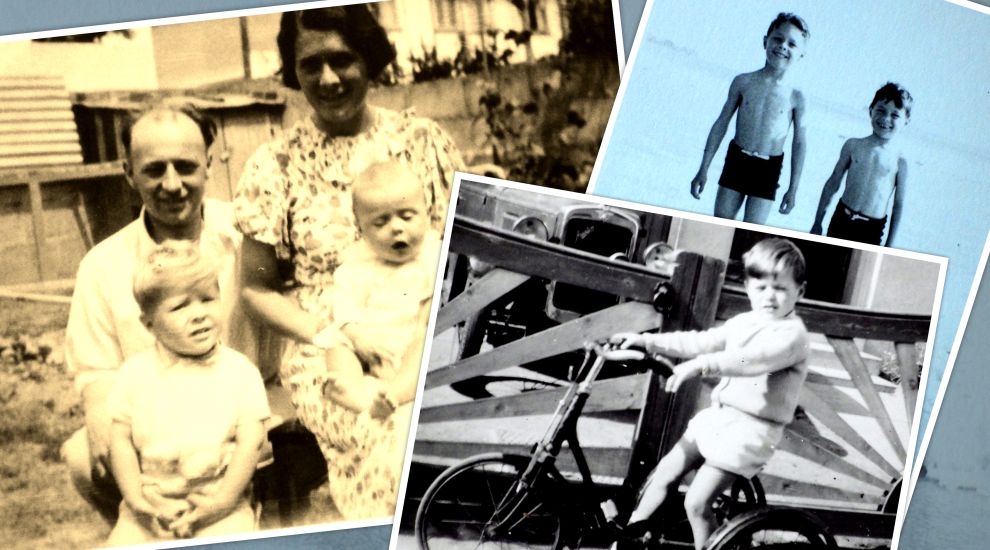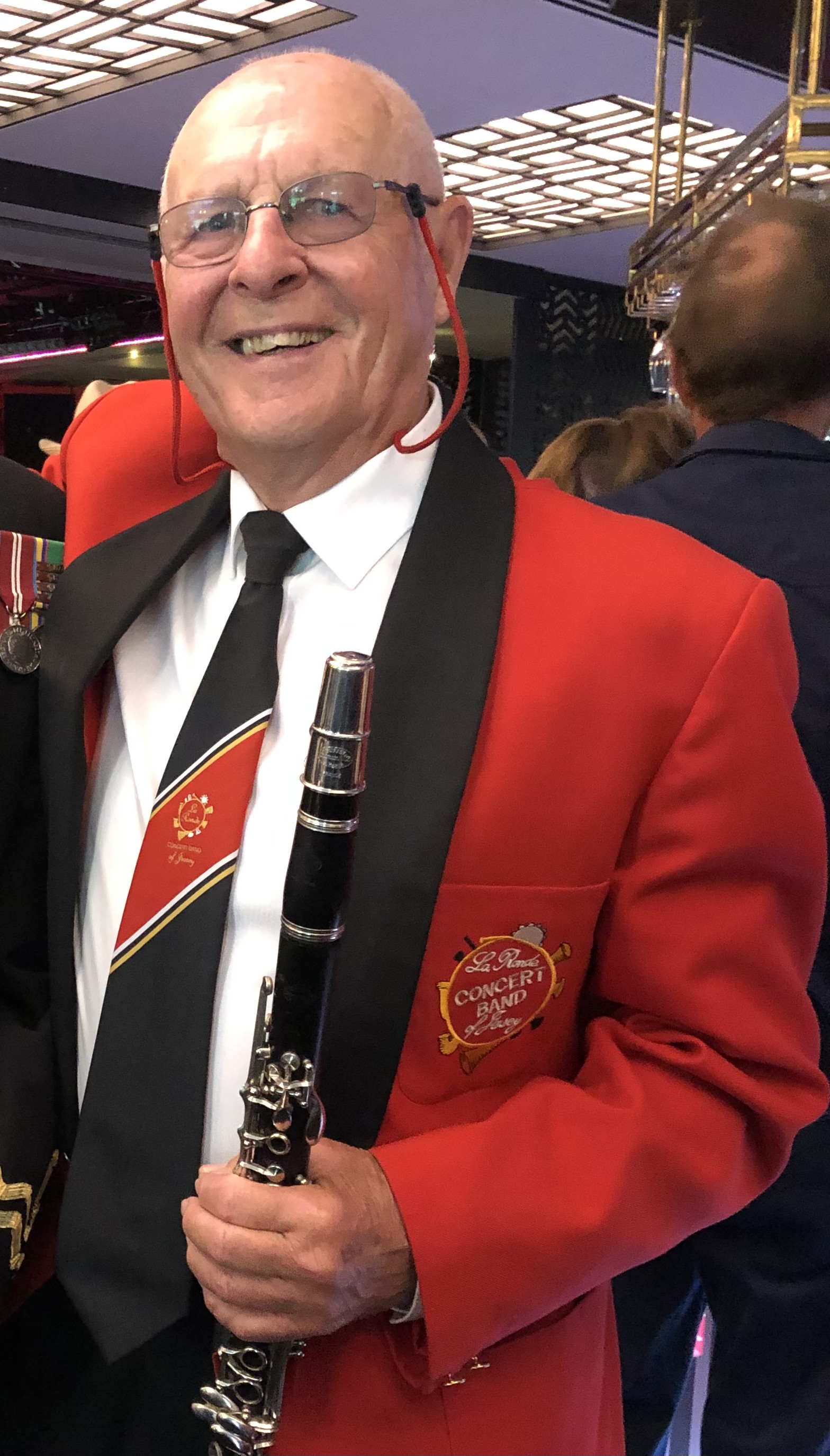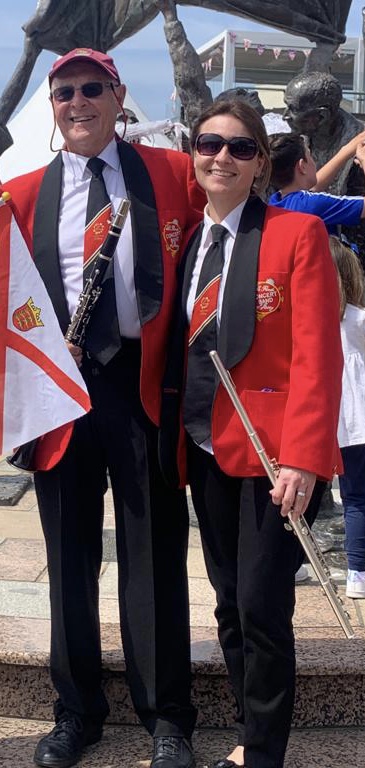


On 9 May 1945, a five-year-old boy stood in front of the Pomme d'Or Hotel with his parents – now, 79 years later, he plays in the same spot every year with La Ronde Concert Band to mark the occasion.
David Perchard wrote about some of his memories of the day and of his childhood under the Occupation...
I was just one month over the age of five years and my brother was three-and-a-half. My parents took us to the Albert Pier for the arrival of the “Tommies”.
I recall that a smallish boat came into the harbour and headed towards what is now known as the New North Quay.
The people on the Albert Quay started running back up the pier. Two men were riding on a “pump trolley” on the rails leading back up the pier. I remember that very clearly.

Pictured: David at the Liberation Day celebrations in 2022
We were standing in front of the Pomme d’Or, roughly where the road and Liberation Square are today. There were people on the balcony of the hotel. Next to us I heard screaming and saw a young woman on the ground surrounded by people who were clearly doing something unpleasant to her.
A little later that day I remember my parents taking us up to Pier Road and we stood outside a wire compound. There was a tall man standing at the wire dressed in rags including his feet. I believe that he was a Russian prisoner of war. He probably looked tall to me as a small five-year-old.
In June just prior to the arrival of the occupying forces my parents took me, at two-and-a-half months of age, down to the harbour and joined the queue of people waiting to evacuate to the UK.
My maternal grandfather, 53 years of age, found out and came down to the harbour and persuaded my parents to return home. He had had experience of the First World War either directly or indirectly.
Sometime in June 1944, I recall looking up from our garden, a muddy patch at the back of our house at Manor Park, and seeing groups of planes heading west. I remember the noise of their engines.
An uncle of ours was delivering bread at the time. He had arrived on his bicycle. I do remember that he made us all go indoors and sit underneath the dining room table.
I am guessing that these were squadrons of bombers returning from bombing runs over Normandy around the time of D-Day and maybe later.
Pictured: David with his parents and younger brother Geoff, probably in summer 1942
Probably late summer of 1944 my mother and us two boys were gleaning in a field at Mont à L’Abbé, not far from where we lived.
The wheat had been harvested and there were stooks of straw drying in the sun. We were allowed to pick up any wheat ears that had been left amongst the cut stalks.
My mother would place the grains of wheat in a tea towel and then hammer them to make coarse flour.
As children we did not have toys with the exception of a carved wooden tractor each with turned timber wheels nailed to the block and a bit of red paint to represent the engine. We had taken these tractors with us. I do remember that we had mislaid them in one of the stooks and had to go back to look for them.
My mother would prepare food for cooking in a large bean crock, tie some grease proof paper over the top, put it into a box lined with straw and then we would take it on a small trolley up to the brick kiln at Mont à L’Abbé which was used as a communal oven.
Later in the day we would collect it and take it home using the straw box on the trolley. The trolley was simply a piece of timber with 4 little wooden wheels and pulled using a cord.
I do not actually remember the food that we ate apart from the bean crock meals which were mostly haricot beans, some pieces of leek and pork trotter. If you were lucky when you ate this there would be a tiny piece of the pork in one’s bowl.
On one occasion my parents cycled with us kids to Mont Mado because they had heard that there might be some sugar beet available but I remember that there wasn’t any to be found.
My mother told me that on one occasion when we went to visit my grandparents and aunt at Gorey Pier, by bicycle, my aunt made a great fuss with the young German sentry about letting us go onto the little bit of sand in the corner of the harbour near the slip.
Apparently he let us do this and took out a photograph of his wife and children back in Germany. My mother was very scared about doing this but was upset about seeing his photograph of his family.
In the 1940s/50s there was an old wooden sign on the wall at the top of the steps into Gorey Harbour opposite my grandparents house with “Achtung Minen” [beware of mines] and the outline of a skull and crossbone still just visible.
Once on our way to visit our grandparents at Gorey we passed a field where an allied plane crash landed, maybe in Trinity? There is a memorial to Bernard Scheidhauer, a French pilot in Rue de Diélament.
I do recall that we had a chicken house and chickens in our back garden at some stage during the Occupation. I remember being in the garden and my dad was talking to two men in raincoats and trilby hats.
I can only guess that this was the centenier and a colleague as the chickens had been stolen. I have no idea how my parents would have been able to feed the chickens.
Pictured: David on a tricycle, with an Austin 7 in the background, probably around 1947.
The tractors that we had as toys were not much bigger than the hand of an adult. I mentioned that the wheels were nailed to the blocks.
At some stage one of the wheels had come off and I stood bare footed on the nail pointing upwards. So maybe the picture I have of being at the General Hospital and having an injection was associated with this.
What I do recall was a man in uniform wearing glasses giving me an injection. The hypodermic syringe was one of those rather large ones of that time made with a glass tube. I have no doubt that I howled at the sight of that.
I do not recall seeing German soldiers apart from the odd occasion. However I do remember being in town in Bath Street near the old Le Gallais shop with my mother. A German soldier was driving a large cart pulled by a horse towards Beresford Street. Sitting next to him was a young girl.
There were stables just down the road from where we lived where two German officers were billeted. Apparently one of the officers would ride a horse up to the house next door to us and visit the owners. I do not recall seeing this. But my mother was really scared of the soldiers and we had net curtains on the windows giving onto the road. I would imagine that my mother would have kept my brother and me away from seeing this.
My father was a carpenter and joiner, as was his father. The only thing that I remember him telling me was that at one stage the carpentry shop where he worked they were making coffins. My maternal grandfather worked on the construction of the New North Road.
Around the time of liberation the houses of people who had collaborated with the occupying force were tarred with swastikas.
The house diagonally opposite to us was tarred and the people who lived there were nowhere to be seen.
There were dribbles of tar on the wall that connected our semi to the one next door as if someone was not sure which house to tar. That was on the wall for years after the liberation.
After the war I noticed that my dad did have a set of earphones. He told us boys about crystal sets but I do not know if he had one during the occupation.
Around December 1944 / early January 1945 Red Cross food parcels were distributed to each person in Jersey having arrived on the Red Cross ship Vega on 30 December 1944.
I remember my parents opening a tin which contained a block of dark concentrated chocolate which they scraped with the edge of the bread knife and that was my first taste of chocolate. We had a tin of nails in the garage after the war with KLIM marked on its surface. The dried milk had long ago been consumed.
Sometime during the run up to Liberation Day a big group of older children came running up our road carrying a large Union Jack on a pole and singing “We won the war in 1944.” Their merriment soon changed when someone shouted that there was a German soldier coming down the road. So they all vanished into the houses and gardens along our road.
I do recall going to the harbour in St Helier when my two uncles returned from the services. On one occasion I seem to remember being at the Victoria Harbour to meet returning servicemen and women. There was a lady dressed all in black who apparently would meet the boats waiting for her son to return. I was aware that he was not coming back. At the age of 5 I think that I did feel the sadness of this.
In 1945 one of my uncles, when visiting us, asked me to draw an apple which I duly did and then a pear which I did and then a banana. I drew a circle. I had no idea what a banana looked like.
Pictured: David with brother Geoff, probably at St Brélade in 1947
Field Marshal Montgomery visited Jersey in 1947 by which time I had started school. All the school children lined up along Victoria Avenue, a single road in those days, to wave flags and cheer as he drove past.
Afterwards we were all given a small tub of vanilla ice cream and a little wooden spoon. My very first ice cream in my life at the age of seven years. One of the boys from my school tossed his up in the air and it vanished down the drain nearby!
When I was at elementary school a bit later all the pupils received a food parcel from Australia and New Zealand.
I do remember clutching my parcel tightly but again one of the boys of about eight or nine years was tossing his parcel up in the air and it landed partly in the gutter of Midvale Road just as a lorry drove past, partly squashing the contents.
I do recall that there was a lot of tinned fruit in the box and possibly some beef stew.
My ex-wife and I had bought a Triumph Spitfire in 1966 in Jersey and exported it to the UK as that was where we were working.
A year later I asked a colleague where I could get the car serviced without going to one of the large local garages that would be expensive.
He suggested a small garage in a village about six miles out of town where a Volkswagen trained mechanic, Mr. V had a small garage. I duly took the car to this garage.
I turned off the main street in the village onto a gravel path to a yard where there was a barn with all the gear for car servicing and repair. The mechanic who was probably in his forties looked at the car and said that he could service it. He noticed that I had a GBJ sticker on the rear and asked me why I had that.
I explained that was my home island but that I now lived nearby. He motioned me to come to a small shed which seemed to be his office.
He pointed to a photograph on the wall. It showed a young German soldier with his rifle on his shoulder and in the background was Corbiere Lighthouse. Not only that but he had married a girl from Jersey.
His son was working with him and he told me that he would be visiting his aunty in the summer. I asked him where she lived. It was just a few houses down from our home in Jersey where my parents live and on the opposite side of the road!
Unfortunately given the circumstances of the time Mr V and his wife could not visit her family in Jersey. After all the violence and grief of WWII I could see some hope for the future at that time.
My parents like many others did not talk about the war years. I have often wondered how they managed during those five years of occupation. Whilst I do not think that my father suffered after effects, I am sure that my mother’s health suffered as a result of the occupation.

Pictured: David Perchard and daughter Alice at the 2022 Liberation Day celebrations
I love celebrating Liberation Day on 9 May but most especially because I am able to play with La Ronde Concert Band of Jersey.
That is where I want to be on that special day for me. I am in the middle of a great band of musicians.
The camaraderie is amazing, our rehearsals can be challenging for me but also great fun.
Charlotte Cooper our Musical Director is inspiring as are the amazing players.
So uplifting to play on the Liberation Day celebrations not far from where I stood on 9 May 1945. I hope that those attending the celebrations may feel the same.
The icing on the cake is that my younger daughter Alice plays in the flute section of the band not far from me in the clarinet section.
La Ronde are set to play on Thursday 9 May on Liberation Square from 08:45. or you can find the band's full schedule on their website.
Comments
Comments on this story express the views of the commentator only, not Bailiwick Publishing. We are unable to guarantee the accuracy of any of those comments.